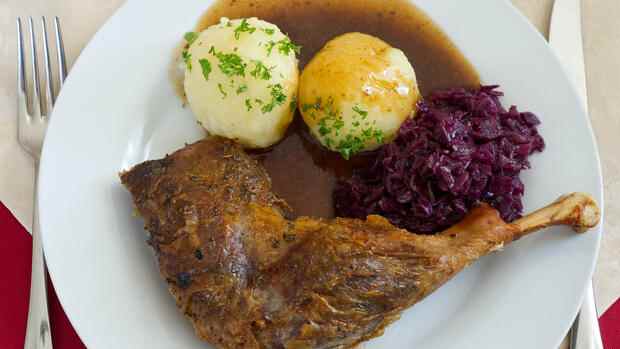For many restaurateurs, roast goose is no longer profitable because they cannot pass the higher prices on to their customers in full.
(Photo: dpa)
Dusseldorf This year Germans have to pay significantly more for roast goose. In Munich’s Hofbräukeller, for example, a portion of goose with red cabbage and dumplings currently costs 26.50 euros. A year ago it was 18.90 euros – an increase of over 40 percent.
Landlady Silja Wardrobe-Steinberg explains that the geese she gets from Austria cost 80 percent more than last year. “Our spending on energy and wages has also increased. However, we are by no means able to pass on all the costs to our guests. Otherwise, no one orders anymore,” says the restaurateur.
A goose doesn’t really make economic sense for them. “But we have to offer the dish because that’s what the guests expect,” says Schrank-Steinberg. Fortunately, not everyone at the table orders a goose.
The fact that geese have become scarce and expensive is not only due to higher feed costs as a result of the Ukraine war. The main cause is avian influenza, which is rampant in Europe. Lorenz Eskildsen, Chairman of the Federal Association of Peasant Goose Farming, states: “In the past few months, goose breeders in Germany, Poland and Hungary have lost significant parts of their stocks.” This not only threatens the leg of the goose on the plate, but also the existence of many farms. “Never before has the goose been in such danger,” says Eskildsen.
Top jobs of the day
Find the best jobs now and
be notified by email.
Avian influenza (type HPAIV H5) is currently spread from Spitsbergen to Portugal. Unlike in the past, it occurs not only seasonally, but all year round. The Friedrich Loeffler Institute for Animal Health explains: “We currently rate the risk of transmission to poultry in Germany as high.”
So far this year, 28 German goose farms have been affected. 52,000 animals died from avian influenza or had to be culled. Last year there were 12,500 geese. So far, there is no vaccine that goose breeders are desperately hoping for.
Over 80 percent of the geese consumed in this country come from Eastern Europe. Animal rights activists criticize the housing conditions there.
(Photo: dpa)
Germany is dependent on imports for geese. Around 2600 tons of goose meat were produced domestically in 2021. A local goose cost an average of 15.95 euros per kilo in retail. “This year it’s three euros more,” Eskildsen expects from the Federal Association of Peasant Goose Keepers. According to the statistical federal state, around 18,200 tons of goose meat are imported.
Animal rights activists criticize intensive fattening abroad
Poland supplies by far the most geese that end up on German plates. Other geese come from Hungary. Prices for imported geese were around EUR 4.50 last year. “This year, buyers have to pay twice as much,” says association chairman Eskildsen.
Animal rights activists have long criticized the husbandry conditions abroad. “The majority of geese from abroad are kept in intensive fattening,” explains the Four Paws organization. “Oat-fed geese are still sold far too cheaply.”
Better animal husbandry is impossible at such prices. In some countries, geese are still stuffed or illegally plucked alive, animal rights activists complain. In Germany, the production of foie gras is forbidden. In France, Belgium, Spain or Hungary, on the other hand, forced fattening is still permitted.
>> Read here: The cockfight – “German farmers make a loss with every egg”
According to Four Paws, the meat from stuffed gooses is partly financed by the sale of fatty livers and can therefore be offered at significantly lower prices. The start-up Gourmey from Paris is working on an alternative without animal cruelty. The French delicacy foie gras is to be cultivated from cells in bioreactors.
Goose meat is considered a specialty. On average, every German treated himself to around 300 grams in 2021. But in times of high inflation, many do without luxury products. The German asparagus and strawberry farmers felt this painfully. Despite low prices, they were left with their goods.
Restaurateurs fear that the Germans are also stingy when it comes to roast goose. Some restaurants only offer geese against prepayment. The risk of getting stuck on goose meat is too great. Other restaurants have removed geese from the menu, such as the world-famous Munich Hofbräuhaus am Platzl.
Spokesman Tobias Ranzinger says: “This year we only have the little goose, the duck.” The traditional restaurant only processes high-quality, regional ingredients. The purchase prices have risen to such an extent that a goose dish at an affordable price is no longer profitable.
More: Head of the Rügenwalder Mühle – “We also want to be a pioneer in meat from cell cultures”
